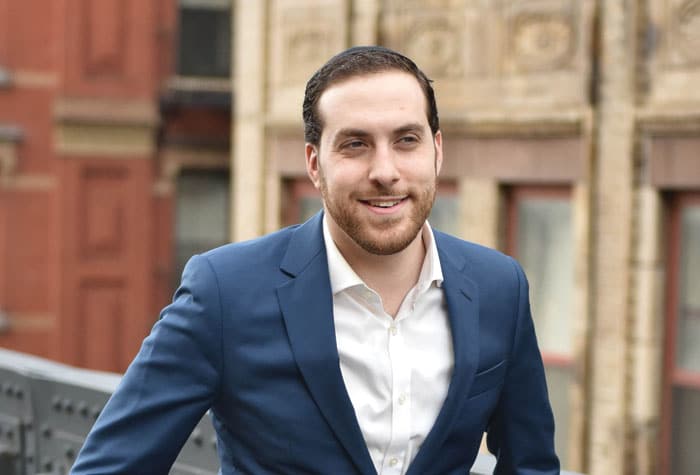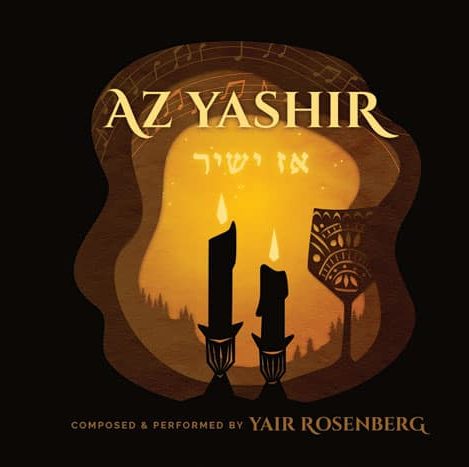 Yair Rosenberg
Yair Rosenberg As a journalist for The Atlantic, Yair Rosenberg is known for his writing about politics, culture, and religion. He’s written for Tablet; his newsletter Deep Shtetl has a significant following; and of course, he has been quoted a litany of times in the Jewish Journal.
But now Rosenberg is being recognized for his talent in music. His latest release is a ten-song album titled “Az Yashir: Songs for Shabbat.” The 10 songs on the album are programmed in the order they are sung on Shabbat.
 The album features eight original compositions and two new adaptations, with an array of influences from Irish folk music to bluegrass to EDM. There are also hints of influence from one of his favorite film composers, the late James Horner, who wrote the original scores for “Titanic,” “Braveheart,” and “Legends of the Fall.” The melody on “V’Shamru” is adapted from a song by the Mormon acapella group, Eclipse, and the melody on “Anim Zemirot” is a traditional melody that originates with Chabad.
The album features eight original compositions and two new adaptations, with an array of influences from Irish folk music to bluegrass to EDM. There are also hints of influence from one of his favorite film composers, the late James Horner, who wrote the original scores for “Titanic,” “Braveheart,” and “Legends of the Fall.” The melody on “V’Shamru” is adapted from a song by the Mormon acapella group, Eclipse, and the melody on “Anim Zemirot” is a traditional melody that originates with Chabad.
Rosenberg’s sound is authentic, the mixing is sophisticated, and the heart is all there to set the mood for Shabbat. The lyrics are centuries old in some cases, but paired with new melodies, instrumentation, and arrangements.
“You have these classics — ‘Shalom Aleichem,’ ‘Lechah Dodi’ — why do I choose these? Why did I do an album that’s all Shabbat songs? Because they’re the sort of songs that most people are likely to know,” Rosenberg told the Journal. “Whether you’re at a synagogue or you’re in summer camp or you’re in school or you’re at your Shabbat table, it would be easy to sing and easy to pick up and learn. And as you listen to it, you may get some stuck in your head, even if you don’t understand what they mean. It’s because they’re designed that way, like folk music. It’s designed to be relatively easy to pick up and sing. And a lot of choices were made to make it easier for people to do.”
The lyric videos for Rosenberg’s music have already racked up thousands of views on YouTube, and the tracks from “Az Yashir” have found their way to Shabbat playlists on Spotify.
Although the album is new, Jewish music-making spans three generations in Rosenberg’s family. His grandfather, Rabbi Israel David Rosenberg, was a Hasidic composer who escaped the Holocaust through Shanghai with several Yeshiva students.
“They were the people who got visas from this Japanese diplomat named Chiune Sugihara, who saved thousands of Jews this way — he went against orders, gave them visas,” Rosenberg said of his grandfather. During the remainder of World War II while in Shanghai, his grandfather composed the song “Shira HaGeulah,” which became his most famous composition. The song, translated into English as “Song of Redemption,” can still be heard at Jewish services around the world today.
Rosenberg recalled that as a kid, he would always sing in shul, especially since his own father, Moshe Rosenberg, was then — and remains today — a Rabbi at Congregation Etz Chaim in Queens.
“I never learned to play an instrument, and I don’t read music,” Rosenberg said. “I had a vague notion of what some of the notes are and things like that, but I’ve never been trained to do those things. And so I would compose melodies in my head, but I didn’t do anything with them because I didn’t really know if there was a way to share or record them when you don’t have those other skills. And that was how [the music] sat for a very long time, until about seven years ago.”
The turning point for Rosenberg came in 2015 when he was accepted into a fellowship in Israel that funded creative projects. There, for the very first time, he found his way to a recording studio. That’s when he set out to turn three particular melodies into songs. That day in Tel Aviv, along with several musicians, Rosenberg recorded all three songs live. Those three recordings are now on the new album: “Lechah Dodi,” “Menucha V’Simcha,” and “Yedid Nefesh.”
Back in the U.S., Rosenberg took his music to the next level by pairing up with producer Charles Newman of New York record label Mother West.
“He has been in the general music industry for decades, but he had not been doing Jewish music,” Rosenberg said of Newman. “And the reason I wanted to work with him is because I wanted to work with somebody who understood Jewish music. Charles is Jewish and he understands where these songs come from and also wasn’t part of the Jewish music world, so that [the music] wouldn’t sound like things you’ve heard before.”
Newman produced “Az Yashir” and released it on Mother West in the fall of 2022.
Still working as a journalist, Rosenberg remains keenly aware of when a new melody forms in his head and quickly records it into the voice memos app on his phone.
“Music comes when it wants to come, it doesn’t come on a schedule. So I will weirdly pull out my phone in strange situations and just start singing into it, even if there are people around. Because you’re not going to remember it otherwise.”
“Music comes when it wants to come, it doesn’t come on a schedule,” Rosenberg said. “If you don’t play instruments, you can’t sit down and riff on a keyboard. So I will weirdly pull out my phone in strange situations and just start singing into it, even if there are people around. Because you’re not going to remember it otherwise.”
He continues to be published in some of the top newspapers in the world, including The New York Times and Wall Street Journal. He doesn’t expect his album “Az Yashir” to turn him into a rock star or wedding singer, but that was never the goal.
“I made these melodies to give people new, contemporary tunes that they could use very easily to enlighten their Jewish lives, to enrich their Jewish lives.”
“I made these melodies to give people new, contemporary tunes that they could use very easily to enlighten their Jewish lives, to enrich their Jewish lives,” Rosenberg said. “And I’m hoping that the more people will discover the music, the more people will find that the music can play a role in their community and in their lives.”
You can listen to Yair Rosenberg’s album, “Az Yashir: Songs for Shabbat,” on Spotify, Apple Music and, Amazon Music. For sheet music, contact him via his website, www.YairRosenberg.com























 More news and opinions than at a Shabbat dinner, right in your inbox.
More news and opinions than at a Shabbat dinner, right in your inbox.